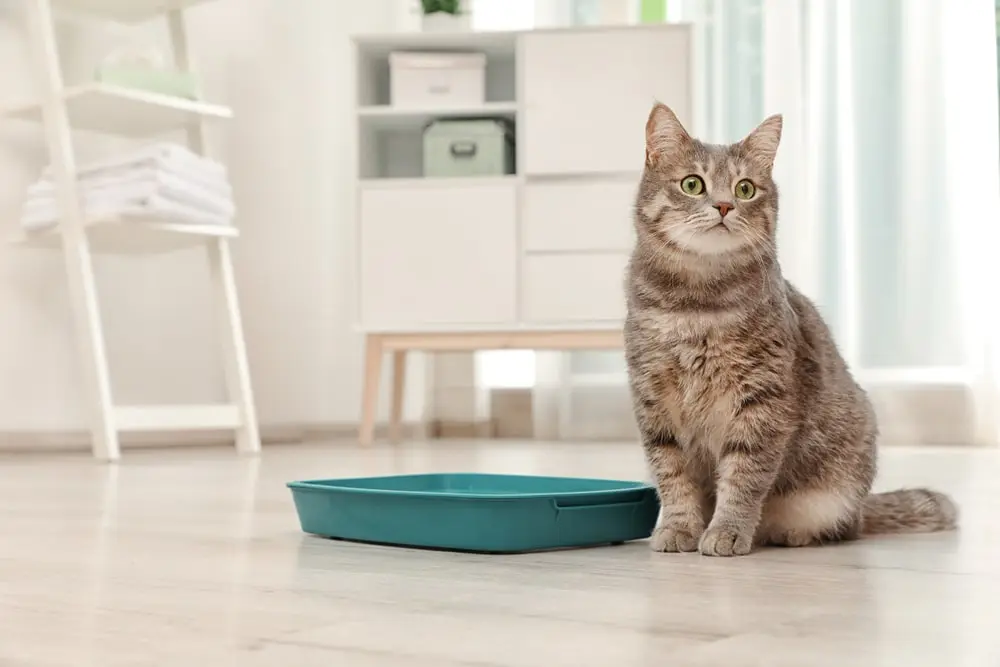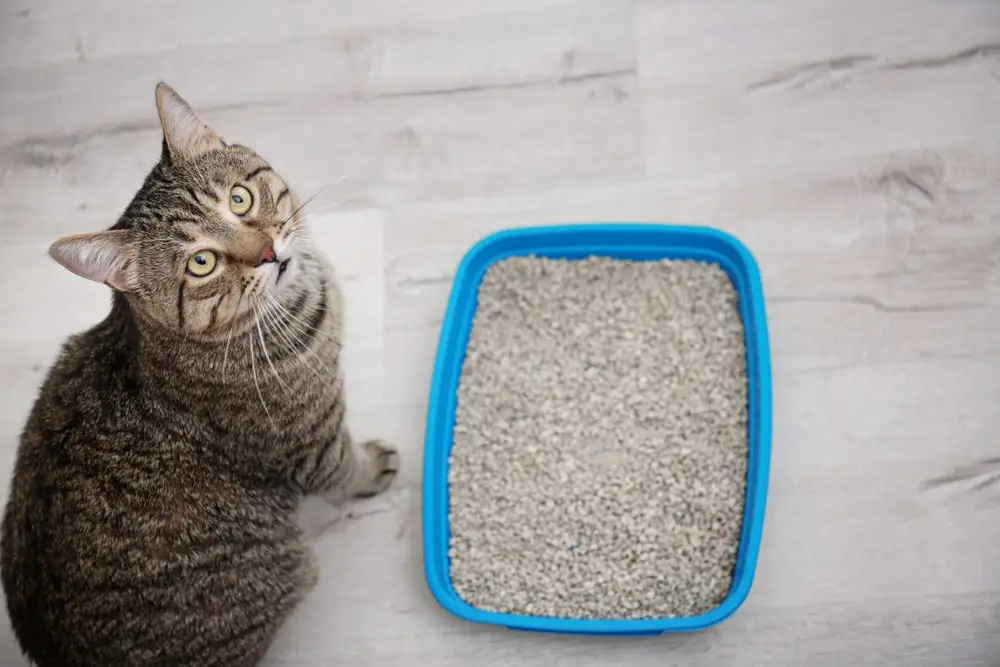PET HEALTH
Constipation in cats can really frustrate pet parents because they don’t know why their cat is uncomfortable or what to do about it. Luckily, constipation is usually a short-term issue that goes away without human assistance.¹
We know how uncomfortable it feels to be constipated, so it isn’t difficult to empathize with our kitties. But cats can be elusive, quiet animals, making it difficult to know when it’s time to call the veterinarian. Let’s discuss the facts about your cat’s constipation, how you can help them, and when to raise the veterinary alarm.
What Is Cat Constipation?
Constipation in cats is defined by the inability to pass or trouble passing stool.¹ The occasional bout of constipation shouldn’t be anything to worry about, but the longer your cat’s feces stay in their colon, the more difficult they will be to pass through. This can lead to something called obstipation, which is severe constipation that can’t be passed without assistance.¹ Once obstipation occurs, your cat will either need an enema or surgical removal to get rid of the fecal matter.
Signs of Cat Constipation
To avoid this sort of issue, pet parents may want to look out for these traditional symptoms:
- Lack of fecal production
- Frequent trips to the litter box
- Vomiting after straining to use the litter box
- Decreased appetite
- Lack of energy
- No interest in playing
As gross as it may sound, checking your cat’s litter box can be an easy way to tell if your cat’s healthy. A constipated cat’s feces may look like hard balls or pebbles, while healthy feces should be soft enough for traditional litter to stick to them.² Keep in mind that sometimes a cat may strain and pass watery poop that looks like diarrhea, but is really a sign of constipation.¹
Causes of Constipation In Cats
Constipation can be caused by a myriad of factors. Here are some of the most common.
Dehydration
Some cats don't have enough water. The most common cause of constipation in cats is dehydration and simply upping their water intake can remedy the problem.¹
Pet parents should consider investing in a water fountain for cats who don’t like their whiskers touching the side of bowls. Another option is getting wet toppers for dry food or treats that have high water content. The more you can encourage your kitty to stay hydrated, the less likely your cat is to experience urinary tract infections and constipation.
Age
Cats of all ages experience constipation; however, senior cats tend to experience constipation more often.¹ This may be because they tend to have ongoing, age-related health issues such as diabetes and arthritis.
Cats with arthritis may have trouble squatting to poop, so they may avoid going to the litter box altogether. And certain diabetic medications can cause dehydration, leading to frequent bouts of constipation.¹
Litter box issues
Every kitty is different and may need different types of litter box arrangements. If your cat is avoiding the litter box, try different types of litter and make sure to keep the litter box clean. If it’s smelly, your cat may hold their poop in an attempt to avoid the smell. Invest in the best litter you can afford; this can cut down on the amount of odor you and your cat have to deal with.
Cats require safe, quiet locations to do their business. Take note of where your litter box currently is, then try a different litter box location that is in a quieter place if necessary. Avoid placing your cat’s litter box near loud appliances or high-traffic areas.
Obstruction
A common cause of constipation can be obstruction. This is caused by something your cat may have swallowed, like a piece of cloth or a small bone.¹ Oftentimes, the obstruction is a mix of poorly digested food, fur, and other material that is stuck in their gut. Pay attention to anything your pet may have ingested within the past 2 days so that you can discuss it with your vet. This can help them determine the cause of your pet’s discomfort.
Lack of exercise
Obese cats are increasingly commonplace and are prone to constipation. A healthy cat needs regular play time to have regular bowel movements. If left to their own devices, a cat will sleep until dinnertime, but this isn’t a good thing.
It may take some time and experimentation to get your cat engaged in play. Try different types of toys that engage their hunting instincts, like feather wand toys or laser pointers. If none of this works, talk with your vet about ways to manage your cat’s behavior.
Underlying health issues
If your cat is experiencing chronic constipation, there may be something besides lifestyle issues going on. Certain conditions, like cancer, can cause constipation in cats. Regular cat wellness checks can help monitor your pet’s health and may help you catch these sorts of things early. However, constipation can be an early indicator that something is wrong so don’t ignore constipation when it occurs.
Obese cats
When Should I Take My Constipated Cat to the Vet?
It’s recommended to call your vet if your cat has been constipated for more than 2 days. If you notice any of the following symptoms, consider taking your pet to an emergency clinic:
- Your cat is not eating.
- Your cat is lethargic or sluggish.
- Your cat is unable to urinate.
- Your cat’s belly is swollen or tender to the touch.
- Your cat has a fever.
These are indications that your cat may either have a serious obstruction or developed a megacolon. According to Merck’s Veterinary Manual, a megacolon is “an enlarged intestine caused by a defect in the muscle strength of the colon.”¹
To treat these conditions, your vet may choose to give your cat an enema to help pass the fecal matter through the gastrointestinal tract.¹ Some vets may prescribe laxatives or other medications to help ease your cat’s discomfort at home.
Surgery can usually be a last resort for cases of constipation in cats, so the sooner you address the problem the better. Delaying care when you notice these symptoms could result in serious health complications for your pet.
How to Help a Constipated Cat
There are things you can do at home if your cat is constipated occasionally. First, consider addressing lifestyle changes like diet and exercise and introducing cat-safe treats high in fiber — like pumpkin — which can keep your cat’s gut healthy. Make sure your cat gets enough water every day and play with them often.
Cat constipation remedies
Second, talk with your vet about veterinary-approved diets and supplements. There are products on the market designed for sensitive stomachs and senior cats that may help prevent chronic constipation. Ask them if stool softeners and supplements, like psyllium powder, may be a good fit for your pet’s lifestyle.
Got Litter Box Drama? MetLife Pet Insurance Can Help
With some tender love and care, you can bring peace back to your cat’s daily trips to the litter box. In the meantime, a cat insurance policy from MetLife Pet Insurance may help alleviate the cost of commonplace expenses associated with treating constipation, like prescription diets, medications, and vet visits.3
MetLife Pet Insurance doesn’t have age limits, either, which means even pet parents with senior kitties can find a policy that’s right for them. Learn more about how pet insurance works or get started today with a free quote from MetLife Pet Insurance, winner of the “Pet Insurance of the Year” Award in the 2024 Pet Independent Innovation Awards Program.


